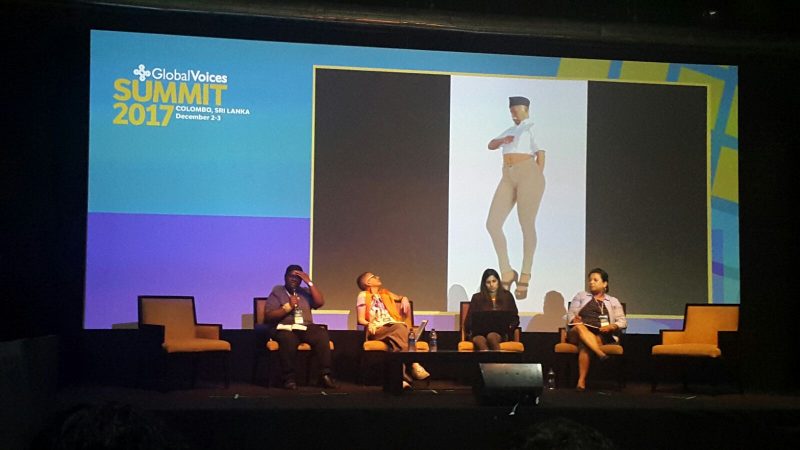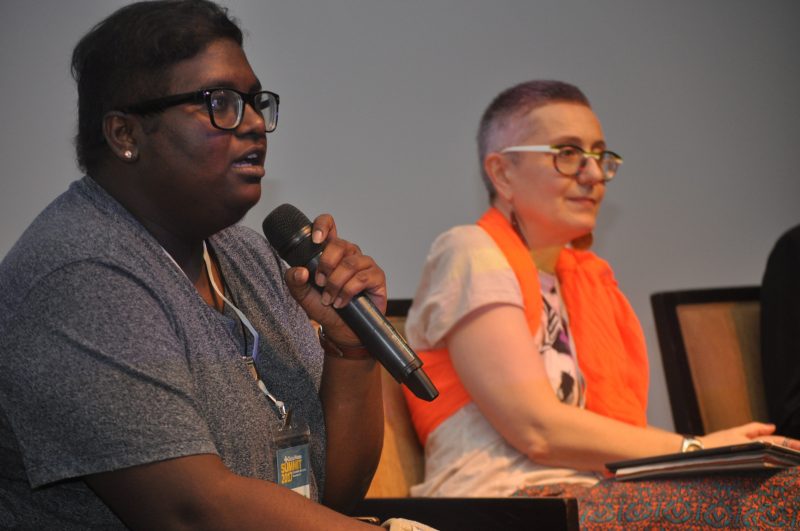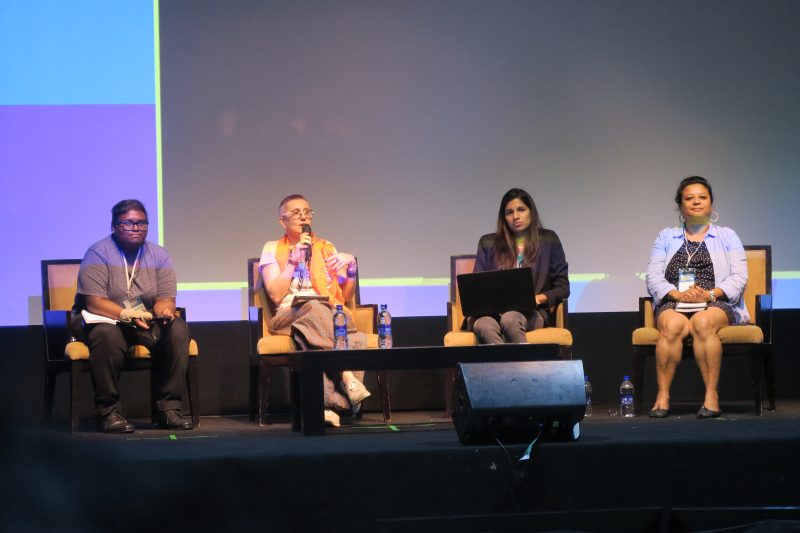
“What is obscene about woman's legs?” – Indian court declared a caricature of powerful Indian right-wing politician ‘obscene’ and used it as excuse to persecute the author. Photo by Filip Stojanovski, CC BY.
The session on “Sex, Rights and Violence” in South Asia presented the results of the research on the issues related to sexuality online from India, Nepal and Sri Lanka.
The discussions ranged from the ways gender and sexual rights advocates use the internet to fight oppression, to how the authorities use of laws and social norms to limit and punish free expression.
Jump to the start of this panel in our Livestream recording on YouTube » [1]
« View the full list of Summit videos [2]
The panel included Smita Vanniyar [3], Jyotsna Maskey [4] and Sanchia Brown [5], contributors to ://EROTICS [6] project. In their introduction, the moderator hvale [7] from APC [8] noted that the governments in the Global South are using obscenity, dignity and sexuality as an excuse to censor online speech, while in the Global North the main narrative is about preventing terrorism.
In India, the legal environment is already restrictive, thanks to the legacy of colonial puritan laws brought about by the UK during the Victorian era to allegedly protect the morality and sexual hygiene of the British soldiers.
New legal restrictions fail to protect the citizens, but the effect of their implementation is to infringe on their rights. For instance, threats to publish videos and images of women being raped online are used to silence victims and as a tool for prolonged blackmail. The restrictive regulation failed to solve and prevent such crimes.
“Obscenity” charges had been particularly useful to target people making caricatures of powerful politicians. Smita Vanniyaar explained the misuse of Section 67 by the government of India to silence critics and opposition.
Samita from @povmumbai [9] is talking about how problematic provisions related to obscenity in Indian law is criminalizing political speech online #GV2017 [10] @loomnepal [11] pic.twitter.com/9N4shUGkXn [12]
— Nighat Dad (@nighatdad) December 2, 2017 [13]
“In Nepal obscenity is a major excuse to censor freedom of expression” (it's pretty similar to Pakistan) #GV2017 [10]
— Sana Saleem (@sanasaleem) December 2, 2017 [14]
On the other hand, the marginalised groups across South Asia start to connect for the first time in history: “Before the Internet a lot of people from the LGBTQ community felt isolated or that they were unique or odd. There was no way to meet or know of others within the community.” The people often hide their identities for honest communication.
‘Your fake profile is a true profile because it reflects who you are’ #GV2017 [10] #GVSummit2017 [15]
— endalk2006 (@endalk2006) December 2, 2017 [16]
To a large degree, the whole topic of sexuality is still not part of the mainstream discourse. The heteronormative culture in Nepal rarely allows space for discussion about it, so “lots of people go online to read about and talk about sex and sexuality.”
Loom Nepal researched their use of online space for expression of sexuality, and the pushback. They realised that Nepalese engage with the internet as a political space, and that “online violence is a manifestation of offline violence.”

Smita Vanniyar and moderator hvale [7]. Photo by Pernille Bærendtsen, CC BY.
The post-conflict reconstruction of Nepalese society is also hindered by the lack of justice for violence against women.
“The government wanted to claim amnesty for perpetrators of sexual violence during the conflict. We don't speak about what happened to us during the conflict, we treat rape as something hush-hush.” #GV2017 [10]
— Dragana Kaurin (@draganakaurin) December 2, 2017 [17]
In general, only some aspects of discussions about sexuality are considered culturally acceptable – those that fit the norms which reinforce conservative values of patriarchy, such as limiting the role of women to motherhood.
“Conversation around sexuality is very much focused on reproductive health of married women.” #gv2017 [18]
— Sana Saleem (@sanasaleem) December 2, 2017 [19]
Both the panel and the subsequent discussion with the audience concluded that even though all human beings are (at least sometimes) sexual, the expression of their sexuality is often quite limited by reactionary forces which try to impose social norms.
In South Asia, arbitrary use of vaguely defined morality as an excuse to suppress free speech has implications which are much wider than the field of gender or sexual rights, affecting the whole societies.
More regulation is not the answer, as the implementation of the existing laws proves ineffective and prone to abuse by authorities.

Sex, Rights and the Internet: A South Asian Exploration panel. Photo by Marie Bohner, CC BY.
The research results outlined during this session will soon be published by APC and its members.